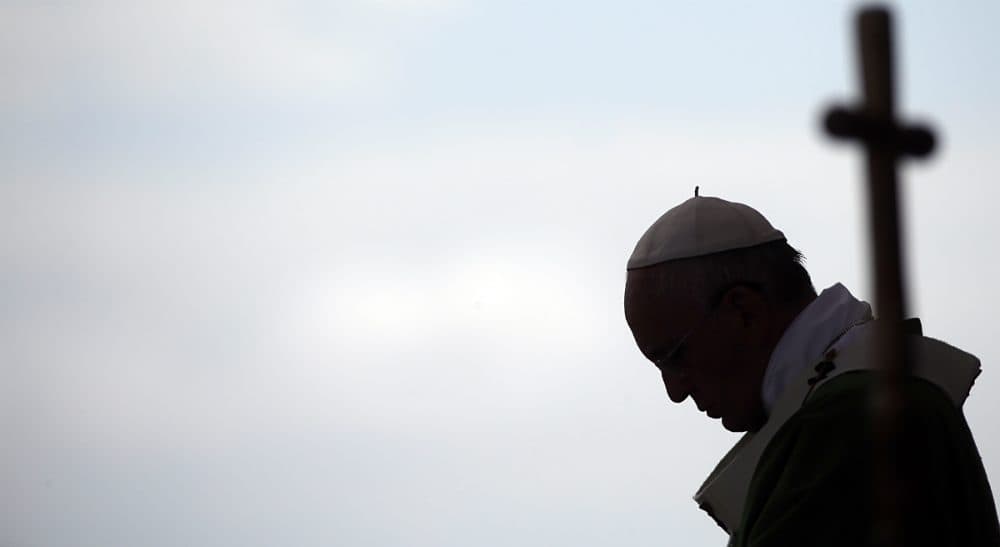Advertisement
What The Pope Knows: The Power Of An Apology

During his recent week-long, three-nation tour of South America, Pope Francis touched on staples of his pontificate, from poverty to care for the environment. But he also made headlines for committing a mundane yet profound act. He apologized.
Francis asked his Bolivian hosts’ forgiveness for the church’s “grave sins” in abetting “the colonial conquest of America.” It was mundane because people apologize every day. It was also profound because it offers a badly needed lesson for American politics: the meaning and necessity of asking forgiveness.
[The Pope's apology] ...offers a badly needed lesson for American politics: the meaning and necessity of asking forgiveness.
Within months of his 2009 inauguration, President Obama took the first buckshot in a continuous salvo from some on the right for his alleged, compulsive groveling for past U.S. misdeeds. In June 2009, the conservative Heritage Foundation enumerated “Barack Obama’s Top 10 Apologies: How the President Has Humiliated a Superpower.”
Culled mainly from foreign speeches, the so-called apologies included words such as “America has shown arrogance,” “we have not been perfect,” “we went off course,” and “potentially, we’ve made some mistakes.” To this American, these phrases, variously describing U.S. dismissiveness of Europe (remember “freedom fries”?) and policies toward the Muslim world, including torture of terrorism suspects, seem accurate enough. Heritage apparently forgot George W. Bush’s campaign pledge of a humbler foreign policy. (Bush forgot it, too, once elected.)
In 2010, Mitt Romney titled his coming campaign’s manifesto "No Apology." “Never before in American history has its president gone before so many foreign audiences to apologize for so many American misdeeds, both real and imagined,” the former Massachusetts Republican governor declared. He added, “There are anti-American fires burning all across the globe; President Obama’s words are like kindling to them.”
The image of a serial Apologizer in Chief was dubious, at best. The Tampa Bay Times, noting that Obama’s admissions of error were “typically leavened by praise for the United States and its ideals,” ran Obama’s speeches by communications, business and foreign affairs experts. Most of them concluded that (1) they were devoid of words like “sorry” and “regret,” and (2) they were intended as placating language to grease diplomatic relations. Other media watchdogs concurred.
Yet the apology rap lives on in some quarters. Last year, two prominent pundits piled on the president for allegedly comparing the U.S. to the ISIS butchers in a speech to the U.N. (Obama had acknowledged the racial turmoil in Ferguson, Missouri.) “This is a continuation of the apology tour, or the confession tour,” Charles Krauthammer groused on Fox News. “At least the one thing you can say about the improvement in Obama’s treatment of his own country is that, six years ago, he went around the world talking about our sins, and here, at least, he stayed home and did it from the podium of the United Nations.”
“He seems to have a metabolic urge to remind us and the rest of the world of something that no one doubts, which is that America has flaws,” agreed fellow panelist George Will. It was left to NPR’s Mara Liasson to point out that, in a hard-hitting speech condemning terrorists and several atrocious governments, Obama wasn’t equating them to us; he was showing humility before a global audience that might thereby take him more seriously.
Francis’s words cast in sharp relief the nuttiness of this no-apology obsession.
First, he was frankly apologetic: “I humbly ask forgiveness, not only for the offenses of the church herself, but also for crimes committed against the native peoples during the so-called conquest of America.”
Second, does the pope despise Catholicism because he sought forgiveness for its sins? I suspect his harshest critics would find the question idiotic; so, too, with questioning Obama’s milder admissions of American flaws.
Third, while going a rhetorical mile further than the president, Francis otherwise mirrored Obama’s fair-minded approach. He apologized to Bolivians but also visited a notorious prison, drawing attention to Bolivia’s sclerotic justice system and crammed jails, while demonstrating that the church is not alone in needing absolution. Far from simply damning the institution he leads, Pope Francis reminded his listeners of the Catholics who worked to help native peoples, “even to the point of martyrdom.”
...does the pope despise Catholicism because he sought forgiveness for its sins?
Give this to Francis: He has a knack for winning over leftists. “For the first time, I feel like I have a pope,” Bolivian President Evo Morales said. He echoed Cuban President Raul Castro, who, similarly impressed, has suggested he might rejoin the church.
As Obama has done, Francis not only acknowledged historical truths with his apology, he paved the way for a respectful hearing from these leaders going forward.
One Catholic commentator hopes that Francis will use his upcoming trip to Cuba to lobby Castro on human rights. Copping to the church’s blemishes may not secure that goal — just ask Obama, whose honesty about America hasn’t mollified all who dislike us. But facts are facts, and admitting them to those you’ve wronged is never a bad place to start.
